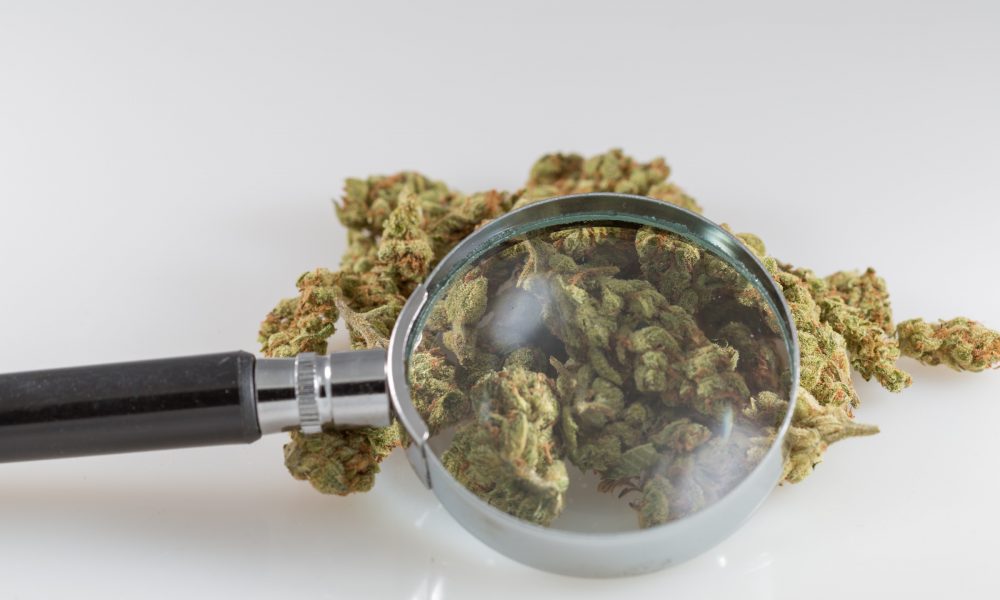A trio of Wisconsin lawmakers traveled across the state line to an Illinois cannabis store on Tuesday to announce the filing of new legislation to legalize marijuana for adults in their own state.
The three Wisconsin Democrats—Sen. Melissa Agard and Reps. David Bowen and Mark Spreitzer—held the event outside a dispensary in South Beloit, Illinois, which sits on the border with Wisconsin. They were joined by Beloit City Council President Clinton Anderson (D).
“All you have to do is look right that way and you’ll see the state of Wisconsin,” Agard said from the Sunnsyide cannabis shop’s parking lot, gesturing north and describing her state as “an island of prohibition.” She pointed out that a number of the vehicles in the parking lot had Wisconsin plates and shared that some of the store’s employees were in fact Wisconsin residents.
Wisconsin is one of a shrinking number of states that have not yet legalized marijuana for either medical or adult use.
“It’s past time to get this done for our communities,” Agard said, noting that only a few years ago colleagues advised her to avoid the issue as a lawmaker. “As we stand here today, it’s safe to say the landscape has changed.”
The bill would legalize, tax and regulate sales of cannabis to adults 21 and older in Wisconsin, bringing the state in line with neighboring Illinois and Michigan, where cannabis is already legal. Adult residents could possess no more than two ounces of marijuana and grow up to six plants for personal use, while visitors from out of state could possess no more than one-quarter ounce.
The plan also creates a path for medical marijuana patients to access cannabis products without having to pay tax. To qualify, individuals 18 and older would need to be diagnosed by a physician as having or undergoing a debilitating medical condition or treatment.
Agard noted the measure would also provide a path to expungement for people with past cannabis convictions and allow people to petition a judge for resentencing. “There are dollars available for people of color and women to be able to access capital to enter the industry, and there is a social justice fund, as well,” she said.
“This is a positive, forward thinking plan that will bring money into the state of Wisconsin,” the senator argued, adding that the policy change is projected “on the conservative side” to bring the state $165 million in annual tax revenue. “It’s time to support this industry and regulate it in an aggressive, pragmatic manner,” she added.
Agard said that she’ll work in coming weeks to build support for the reform among her colleagues regardless of their party and will be actively looking to add co-sponsors to the bill. “I’m hoping every single one of those folks will look at this bill earnestly and in detail,” she said.
Sixty percent of the tax revenue would go to reinvest in communities that have been impacted by the drug war, Agard said. The ACLU also estimates that the state will save $44.3 million in taxpayer money each year simply by ending the criminalization of cannabis.
We are at Sunnyside Dispensary in South Beloit to learn about the safety and benefits about legal cannabis! Stay tuned for the press conference at 10:30 📣 pic.twitter.com/2XC2kZqOIh
— Senator Melissa Agard (@senator_melissa) August 10, 2021
Bowen, who also spoke at the event, drew attention to the profound racial disparities experienced by people of color in terms of how the state’s marijuana and other drug laws are enforced.
The representative said Black and brown Americans are four times more likely to be arrested for a cannabis-related offense. And during the past 10 years, he said, drug sentences for Black men have been 10 percent longer than sentences for their white counterparts.
In Wisconsin, racial disparities in arrests are even more striking than the four-to-one national rate. Black people in the state were almost six times more likely than whites to be arrested for marijuana possession despite using cannabis at similar rates.
—
Marijuana Moment is already tracking more than 1,200 cannabis, psychedelics and drug policy bills in state legislatures and Congress this year. Patreon supporters pledging at least $25/month get access to our interactive maps, charts and hearing calendar so they don’t miss any developments.![]()
Learn more about our marijuana bill tracker and become a supporter on Patreon to get access.
—
Some of the comments by lawmakers at Tuesday’s event echoed the exasperation of Wisconsin Gov. Tony Evers (D), who in April said he was “tired” of hearing about sales figures from his neighbor’s adult-use market and joked that Illinois Gov. J.B. Pritzker (D) “thanks me for having Wisconsinites cross the border to buy marijuana.”
Evers, for his part, tried to legalize recreational and medical marijuana through his proposed state budget earlier this year, but a GOP-led legislative committee stripped the cannabis language from the legislation in May. Democrats tried to add the provisions back through an amendment the next month, but Republicans blocked the move. Rep. Evan Goyke (D) urged colleagues on the other side of the aisle at the time to “stop running from this debate.”
Agard’s new bill isn’t her first time filing legalization legislation.
“The fact that I have introduced this bill for the past eight years with no public hearing is appalling,” she said in a press release on Tuesday. “It is reckless that the Republicans refuse to allow Wisconsinites to speak on this issue.”
GOP lawmakers, for their part, have filed bills to more modestly decriminalize marijuana possession in the state, but none of those proposals advanced during this year’s session.
Evers held a virtual town hall event in April where he discussed his cannabis proposal, emphasizing that polling demonstrates that Wisconsin residents back the policy change.
I was honored to join @senator_melissa, @DavidFBowen, Beloit City Council President Clinton Anderson, Rock County Board Supervisor @YuriRashkin, and other partners as we call for legalizing marijuana in Wisconsin.
— Rep. Mark Spreitzer (@RepSpreitzer) August 10, 2021
“In one of the rooms I work in at the Capitol, on the ceiling it says: ‘The will of the people is the law of the land,’” Evers said, “and I take that seriously. When people are passing referenda to say, ‘We believe that we should have recreational marijuana and/or medicinal marijuana,’ that’s what we should do as legislators and as leaders in the executive branch.”
Locally, Wisconsin voters in three jurisdictions last year approved non-binding advisory questions in favor of marijuana legalization. Those moves came after Wisconsinites overwhelmingly embraced cannabis reform by supporting more than a dozen similar measures across the state during the 2018 election.
Late last year, city officials in the state’s capital, Madison, voted to remove most local penalties for cannabis possession and consumption, effectively allowing use by adults 18 and older.
Meanwhile in Illinois, regulated sales of cannabis to adults broke yet another monthly sales record last month—the fourth time in five consecutive months. Gross receipts in the state totaled $127.8 million in July, and since March monthly sales have consistently exceeded $100 million.
Illinois officials have emphasized that the tax dollars from all of these sales are being put to good use. For example, the state announced in January that it is distributing $31.5 million in grants funded by marijuana tax dollars to communities that have been disproportionately impacted by the war on drugs.
Read the new Wisconsin marijuana legalization bill below:
Wisconsin Marijuana Legaliz… by Marijuana Moment
Marijuana Sales Increased In Multiple States During COVID, Study Finds
Medical Disclaimer:
The information provided in these blog posts is intended for general informational and educational purposes only. It is not a substitute for professional medical advice, diagnosis, or treatment. Always seek the advice of your physician or other qualified healthcare provider with any questions you may have regarding a medical condition. The use of any information provided in these blog posts is solely at your own risk. The authors and the website do not recommend or endorse any specific products, treatments, or procedures mentioned. Reliance on any information in these blog posts is solely at your own discretion.







